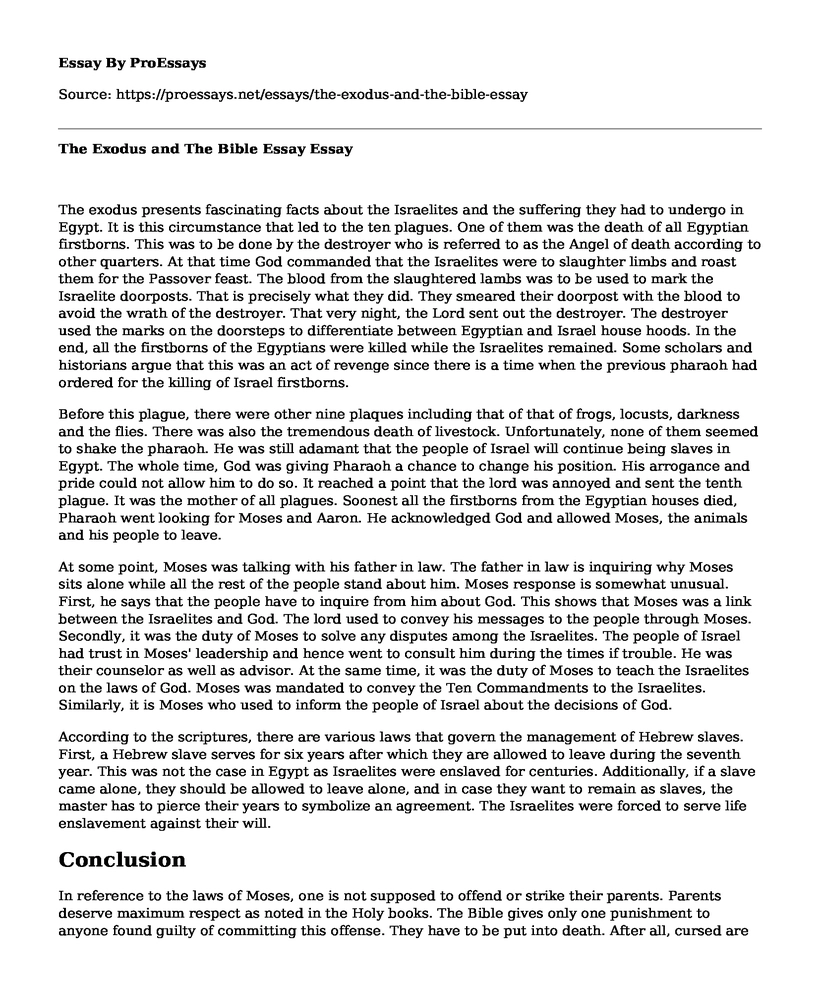The exodus presents fascinating facts about the Israelites and the suffering they had to undergo in Egypt. It is this circumstance that led to the ten plagues. One of them was the death of all Egyptian firstborns. This was to be done by the destroyer who is referred to as the Angel of death according to other quarters. At that time God commanded that the Israelites were to slaughter limbs and roast them for the Passover feast. The blood from the slaughtered lambs was to be used to mark the Israelite doorposts. That is precisely what they did. They smeared their doorpost with the blood to avoid the wrath of the destroyer. That very night, the Lord sent out the destroyer. The destroyer used the marks on the doorsteps to differentiate between Egyptian and Israel house hoods. In the end, all the firstborns of the Egyptians were killed while the Israelites remained. Some scholars and historians argue that this was an act of revenge since there is a time when the previous pharaoh had ordered for the killing of Israel firstborns.
Before this plague, there were other nine plaques including that of that of frogs, locusts, darkness and the flies. There was also the tremendous death of livestock. Unfortunately, none of them seemed to shake the pharaoh. He was still adamant that the people of Israel will continue being slaves in Egypt. The whole time, God was giving Pharaoh a chance to change his position. His arrogance and pride could not allow him to do so. It reached a point that the lord was annoyed and sent the tenth plague. It was the mother of all plagues. Soonest all the firstborns from the Egyptian houses died, Pharaoh went looking for Moses and Aaron. He acknowledged God and allowed Moses, the animals and his people to leave.
At some point, Moses was talking with his father in law. The father in law is inquiring why Moses sits alone while all the rest of the people stand about him. Moses response is somewhat unusual. First, he says that the people have to inquire from him about God. This shows that Moses was a link between the Israelites and God. The lord used to convey his messages to the people through Moses. Secondly, it was the duty of Moses to solve any disputes among the Israelites. The people of Israel had trust in Moses' leadership and hence went to consult him during the times if trouble. He was their counselor as well as advisor. At the same time, it was the duty of Moses to teach the Israelites on the laws of God. Moses was mandated to convey the Ten Commandments to the Israelites. Similarly, it is Moses who used to inform the people of Israel about the decisions of God.
According to the scriptures, there are various laws that govern the management of Hebrew slaves. First, a Hebrew slave serves for six years after which they are allowed to leave during the seventh year. This was not the case in Egypt as Israelites were enslaved for centuries. Additionally, if a slave came alone, they should be allowed to leave alone, and in case they want to remain as slaves, the master has to pierce their years to symbolize an agreement. The Israelites were forced to serve life enslavement against their will.
Conclusion
In reference to the laws of Moses, one is not supposed to offend or strike their parents. Parents deserve maximum respect as noted in the Holy books. The Bible gives only one punishment to anyone found guilty of committing this offense. They have to be put into death. After all, cursed are those who deliberately strike their parents with a purpose of hurting them. One of the Ten Commandments clearly states that parents have to be children have to respect and obey their parents. The reward for obedience is more days on earth while the punishment is death.
Cite this page
The Exodus and The Bible Essay. (2022, Aug 01). Retrieved from https://proessays.net/essays/the-exodus-and-the-bible-essay
If you are the original author of this essay and no longer wish to have it published on the ProEssays website, please click below to request its removal:
- Essay Sample on Islamic Art
- Axiology Essay Example
- Essay Sample on Abraham the Chosen One
- Essay Sample on Confucius Philosophy
- Teleological Argument for the Existence of God Essay
- Essay Sample on Discovering Your Identity in Christ: Benefits and Reasons
- Confucian Principles in Government: Examining Harmony, Education, and Leadership - Essay Example







